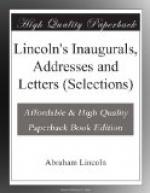The sum of the whole is that of our “thirty-nine” fathers who framed the original Constitution, twenty-one—a clear majority of the whole—certainly understood that no proper division of local from Federal authority, nor any part of the Constitution, forbade the Federal Government to control slavery in the Federal Territories; while all the rest probably had the same understanding. Such, unquestionably, was the understanding of our fathers who framed the original Constitution; and the text affirms that they understood the question “better than we.”
But, so far, I have been considering the understanding of the question manifested by the framers of the original Constitution. In and by the original instrument, a mode was provided for amending it; and, as I have already stated, the present frame of “the government under which we live” consists of that original, and twelve amendatory articles framed and adopted since. Those who now insist that Federal control of slavery in Federal Territories violates the Constitution, point us to the provisions which they suppose it thus violates; and, I understand, they all fix upon provisions in these amendatory articles, and not in the original instrument. The Supreme Court, in the Dred Scott case, plant themselves upon the fifth amendment, which provides that “no person shall be deprived of life, liberty, or property without due process of law;” while Senator Douglas and his peculiar adherents plant themselves upon the tenth amendment, providing that “the powers not delegated to the United States by the Constitution are reserved to the States respectively, or to the people.”
Now, it so happens that these amendments were framed by the first Congress which sat under the Constitution—the identical Congress which passed the act already mentioned, enforcing the prohibition of slavery in the Northwestern Territory. Not only was it the same Congress, but they were the identical, same individual men who, at the same session, and at the same time within the session, had under consideration, and in progress toward maturity, these constitutional amendments, and this act prohibiting slavery in all the territory the nation then owned. The constitutional amendments were introduced before, and passed after, the act enforcing the Ordinance of ’87; so that, during the whole pendency of the act to enforce the Ordinance, the constitutional amendments were also pending.
That Congress, consisting in all of seventy-six members, including sixteen of the framers of the original Constitution, as before stated, were preeminently our fathers who framed that part of “the Government under which we live,” which is now claimed as forbidding the Federal Government to control slavery in the Federal Territories.
Is it not a little presumptuous in any one at this day to affirm that the two things which that Congress deliberately framed, and carried to maturity at the same time, are absolutely inconsistent with each other? And does not such affirmation become impudently absurd when coupled with the other affirmation, from the same mouth, that those who did the two things, alleged to be inconsistent, understood whether they really were inconsistent better than we—better than he who affirms that they are inconsistent?




